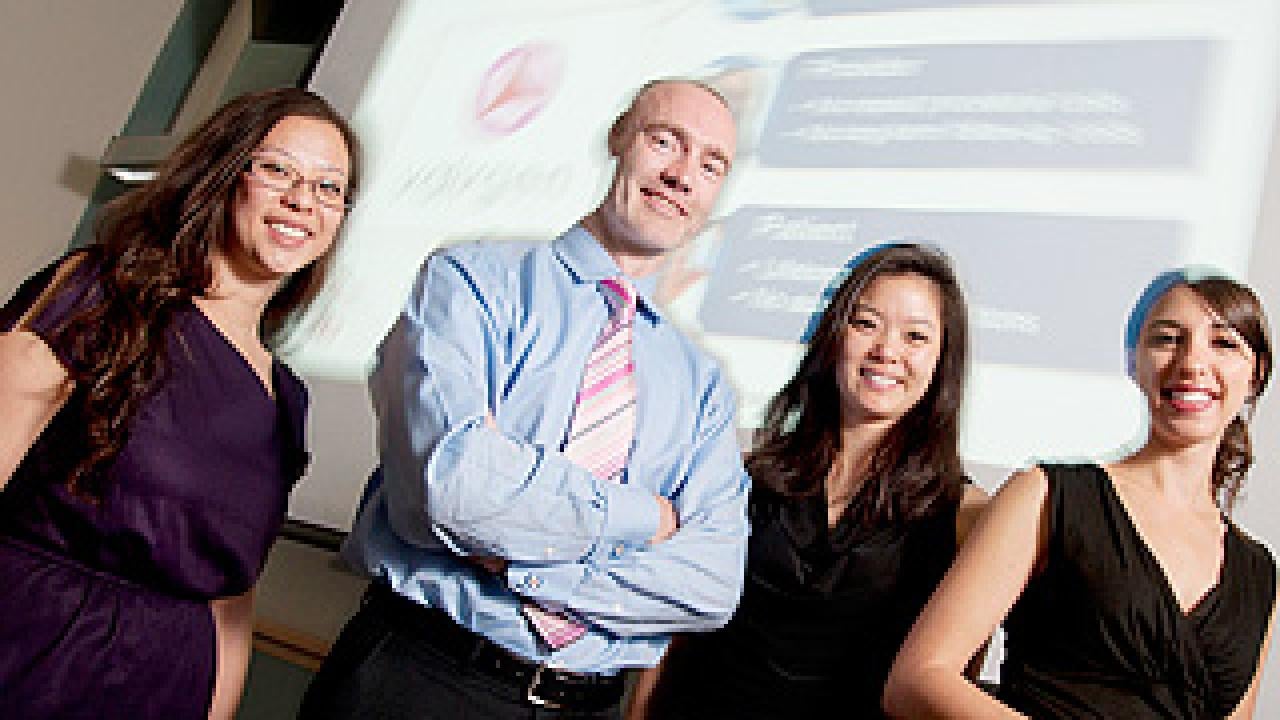A new approach to tissue preparation that makes heart valve replacements less likely to be rejected by the body’s immune system — potentially giving transplant patients longer, healthier lives — was the clear favorite in this year’s University of California, Davis, business plan competition — sweeping both the first prize and the People’s Choice award.
ViVita Technologies, a team comprising a UC Davis veterinarian and three biomedical engineering doctoral students, took home a total of $12,000 in the 13th annual Big Bang! Business Plan Competition, run by MBA students in the UC Davis Graduate School of Management: $10,000 for first place, decided by a team of judges, and $2,000 for the People’s Choice award, decided by a vote of the approximately 150 people who attended the awards ceremony Thursday evening (May 16) at the UC Davis Conference Center.
Second prize of $5,000 went to Davis Chem, a team that is working to commercialize a sustainable method of producing isobutryaldehyde, a common base chemical used in everything from paint to cosmetics, with genetically modified E. coli bacteria rather than with the petroleum products currently used in production.
ViVita Technologies was driven to create its product to address the current shortage of organs. “But unlike with current heart valve transplants, the patient would be free from a lifetime of drugs,” said Maelene Wong, chief executive officer of the nascent company.
The ViVita process removes substances that trigger patients’ immune response while preserving the structural integrity and functional properties of the replacement valve tissue. The method has been successfully tested on small animals, they said.
The proprietary process allows the patient’s own cells to join and grow with the transplant tissue — a process that the team says could eventually be used for any organ transplant. Such an organ transplant would allow the person to lead a normal, healthy life without fear of organ rejection and the need to spend a lifetime on anti-rejection medication. It would also allow for better transplant methods for children, who often need new transplants, and additional surgeries, when their bodies grow, Wong said.
She and two fellow biomedical engineers teamed with Leigh Griffiths, an assistant professor of cardiology and cardiac surgeon in the UC Davis School of Veterinary Medicine, to develop the technology. Last summer, they honed their business development skills to create ViVita through the Biomedical Engineering Entrepreneur Academy at the UC Davis Child Family Institute for Innovation and Entrepreneurship.
The second-place team of part-time MBA students initially thought of developing an application to monitor snowboarding velocity, but thought the better of it after learning of an existing UC Davis patent during a business development clinic last year. The patent is held by Shota Atsumi, an assistant professor of chemistry.
“We didn’t even know how to pronounce the chemical at first,” said MBA student Sandeep Deshpande. “Wil (Agatstein, the instructor) helped convince us that this existing patent was a better way to go.”
Said Agatstein, who is executive director of the Child Family Institute: “And they took the idea and ran with it.”
The team plans to use the money to start a pilot project next year.
This was the first time the five finalist teams included second-year undergraduates — a change Agatstein said is due to more undergraduates interested in entrepreneurship at an earlier age. That young team, AmberCycle, which includes Akshay Sethi, 19, a biochemical and molecular biology student, Matthew Remich, 20, a managerial economics student, and MBA student Gerald Dion, developed a system to degrade plastics so that they are cheaper and easier to recycle.
Andrew Hargadon, faculty director of the Child Family Institute, said he had seen a change in the volume and quality of Big Bang! entries, and expects many of them to become businesses in the community — as multiple winners from past years already have. “To see them morph from class projects into real businesses is truly terrific,” he said.
Roger Akers, of Akers Capital, who judges the competition each year, said he has seen vast change in the competition. “Every year the quality improves — and it’s not just the business plan, it’s the quality of the people and their projects. It’s wonderful to see.”
This year, the Big Bang! received a $50,000 gift from Andrew Barkett, an engineering manager at Facebook and a 2009 graduate of the Graduate School of Management.
About the UC Davis Child Family Institute for Innovation and Entrepreneurship
The UC Davis Child Family Institute for Innovation and Entrepreneurship serves as the nexus for entrepreneurship education and research — and as a springboard for entrepreneurial initiatives on the UC Davis campus. To accomplish this, the institute brings science, engineering and business students and faculty together with experienced entrepreneurs, investors and corporate leaders in a highly collaborative environment that blends effective theory with hands-on participation and solution-driven innovation.
Under the direction of Professor Andrew Hargadon, the institute provides researchers, MBA students and others with the necessary skills, resources and network support to turn their ideas into action. Whether for profit or for social benefit — or both — the institute’s programs enable students to envision a better world and make it a reality.
The Child Family Institute for Innovation and Entrepreneurship is a Center of Excellence at the Graduate School of Management.
Media Resources
Karen Nikos-Rose, Research news (emphasis: arts, humanities and social sciences), 530-219-5472, kmnikos@ucdavis.edu
